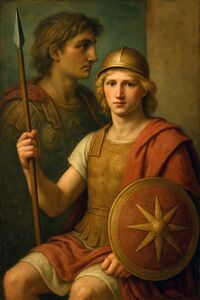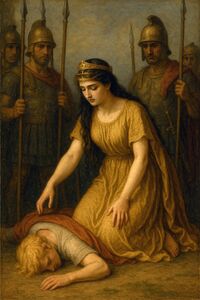Alexander IV
Alexander the Great was an act that would be hard to follow. His empire stretched from Greece to India and as far south as Egypt. For his only male heir — Alexander IV of Macedonia — it would prove impossible to follow. Hence his sobriquet Alexander the Not So Great.
Alexander IV was a weak echo of his father, like Caesarion the son of Julius Caesar, Napoleon II heir of Napoleon I, Fred Wang (Honey, I Shrunk the Company!) son of An Wang, and various Kennedys, Bushes, and Clintons of United States politics.
Family background[edit]
Alexander IV arrived in this world a few months after the death of his father in 323 BC. His mother was the fiery Roxane from Bactria on the Persian frontier, a wild land of two-humped camels and savage inter-tribal wars. Roxane was a warrior princess who was disgusted that her father had her married off to some swarthy, Greek-speaking foreigner. So much did she loathe her spouse that she tried to murder him on their wedding night — at least according to Oliver Stone's film about the Macedonian bleached-blond beach bum. After that bumpy start, the couple managed to avoid killing each other, at least until they produced a male heir.
When Alexander Sr died in Babylon in 323 BC Roxane was pregnant and confident she was carrying a boy. But her late husband had married another woman called Stateira who was the eldest daughter of Darius III, the last Persian king. Fearing that Stateira could also be in the family way too, she persuaded the Macedonian senior general Perdiccas to have her killed. In return Roxane would support his claim to be regent. Perdiccas's soldiers arranged two fatal boudoir accidents for Stateira and her younger sister Parysatis (a widow of Alexander's best pal Hephaestion). It was a Macedonian tradition to have a bloodbath of problematic relatives at the start of a new reign.[1] Back in 336 BC, Alexander and his mother Olympias had organised one to eliminate King Philip II, his new (seventh) wife and baby son Keranos. The only possible son of Alexander Sr to survive was Heracles, a young boy who was said to be his son by another Persian princess called Barsine. However he was regarded as illegimate and therefore ineligible for the throne.
Regency[edit]
Alexander the Great's generals needed a king anyway and would not wait for Roxane to finish her pregnancy. Instead, they crowned Alexander the Great's elder half brother Arrhidaeus, directing him to share the throne with a foetus for now. Arrhidaeus adopted the more pompous name Philip III, but most Macedonians believed he had only survived the bloodbath because Alexander Sr had dismissed him as too feeble-minded to threaten his power — possibly as a result of a near-miss during Olympias's assassination spree. In truth Phillip III was dominated by his new wife Eurydice, a warrior niece of Alexander Sr. whose mother had been a half sister of Alexander Sr until she had been murdered by the regent.
With one king as yet unborn and another with a shaky mandate, true authority devolved to Perdiccas, a favoured general of Alexander. He now controlled all of Alexander the Great's realm, including custody of Alexander Jr the moment he was born. The boy king would never escape his gilded prison.
Moving to Macedonia[edit]
Perdiccas's grip on Alexander and his mother seemed secured. When Roxane indeed gave birth to a son Alexander IV (Alexander Jr) Perdiccas's power was even more secure. There was even a rumour he wanted to marry Roxane and become Alexander Jr's step dad. Instead Perdiccas married the dowager Queen of Epirus who was Alexander Sr's sister Cleopatra.
This state of affairs lasted until 320 BC when the regent was assassinated in his tent in Egypt whilst warring against Ptolemy. The empire turned to a heretofore-unknown 'seniority rule'. This assured elderly rulers serving brief terms. Antipater replaced Perdiccas as regent. He had run both Macedonia and Greece whilst Alexander the Great was away winning glory against Persia. Antipater took physical hold of Alexander Jr and Roxane. Philip III and his wife Euridyce were brought along to play the happy family.
Antipater lasted only one year. The next grizzled old soldier to rule was Polyperchon, who had been a companion of Philip II. The other Macedonian generals accepted the arrangement, seeing Polyperchon was far too weak to impose his will on behalf of baby Alexander Jr. The regent's son, Cassander, took offence at being passed over for the regency gig.
Granny wreaks her revenge[edit]
Alexander Jr's granny now returned to politics. Olympias had long wanted Philip III and his wife Eurydice dead, but the younger Eurydice — who had a fetish about armour — struck first. She got Polyperchon retired and made Cassander the new regent. However, when Cassander was called away, Polyperchon came out of retirement and joined forces with Olympias against Philip III, Eurydice, Cassander, Antigonus and Ptolemy.
Olympias did not hang around. She invaded Macedonia from Epirus (her home country), making a great play about being the mother of a God. Her army made short work of the forces gathered by Philip III and Eurydice. Their troops had melted away once they knew it was the deadly Olympias they were up against. Olympias then arrived in the Macedonian city of Pydna. She had promised no mercy for Philip and Eurydice, and they got none. Alexander Jr, now aged six, was the only heir.
Alexander Jr and Roxane were under Olympias's protection, but any sense of security was short-lived. Polyperchon had stayed behind in Epirus when Olympias had gone to war. He was now a regent with no charges. Philip III and Eurydice were dead and Alexander Jr and Roxane were with Olympias. The old queen may have expected Polyperchon to help her, but he did not.
Cassander wants Alexander[edit]
Cassander arrived with his army outside Pydna in early 316 BC. Olympias refused to surrender either herself or her grandson. She had already taken revenge on partisans of Cassander so unlucky as to be in Pydna when she arrived. She destroyed some of their family tombs as well.
Cassander was open to negotiation, as Olympias' position was hopeless. Olympias offered to end the war if her life was spared. Cassander promised that no Macedonian soldier would kill her. Unfortunately, he did not speak for the townspeople. Some of them whose relatives Olympias had ordered killed had the final say. They stoned her to death and left her body to the dogs.
Alexander Jr and Roxane watched from the sidelines. Although currently in control, Cassander was merely the regent. Alexander Jr would become the lord of Europe and Asia once he reached the age of majority, in 305 BC. However, grand titles aside, Alexander IV was still a prisoner in all but name.
Death of a prince and his mother[edit]
Alexander and his mother were taken to the Macedonian city of Amphipolis. Cassander could have had them killed right away but was unsure how the other Macedonian leaders would take that. Polyperchon was still on the scene in Greece and appears to remain keen to be still Alexander Jr's regent, even if he wasn't anywhere near the boy. When that failed Polyperchon instead started championing the rights of the overlooked Heracles and Barsine who had managed to survive so far.
Since Cassander had no expectation that Alexander IV would forgive him for killing his granny, he came to the conclusion that the young prince and also his mother would have to die. Cassander may have hoped they would be die of natural causes like tripping down stairs or falling on a sword. Eventually Cassander decided to 'hurry things along'. He had them poisoned in 309 BC. This only left Heracles and Barsine but in some very shady deal with Cassander, Polyperchon had these two die 'suddenly'. That marked the extinction of Alexander the Great's immediate family.
Postscript[edit]
Though Alexander IV was dead, for a further four years the empire of Alexander was still theoretically one united realm. Curiously the generals who had survived the confusing wars amongst the successors still waited a few more years before formerly declaring themselves independent rulers. They did on the day Alexander IV would have become an adult on his 18th birthday in 305 BC. These Macedonians had a sense of twisted humour.
References[edit]
- ↑ There had been at least five civil wars between rival heirs to the Macedonian throne in the past 70 years.





